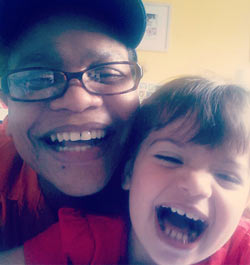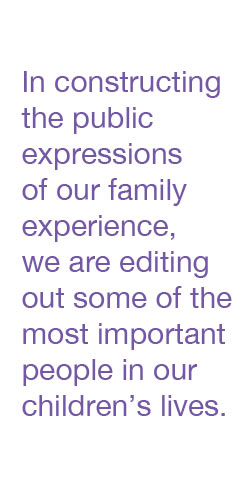There’s Someone Missing From My Facebook Photos


by Natalia Mehlman Petrzela
The person who makes my seemingly effortless parenting possible:
my nanny.
I was frantically tapping away at my office computer when my phone buzzed. “Nancy,” our nanny’s name, flashed on the screen. Smiling, I swiped through the images of my children she had texted: my 2-year-old daughter, wet from the playground sprinkler, her older brother scooting down the street. The third image was a “selfie” of Nancy and our daughter, their faces crowding the frame.
The picture was sweet, so I did what has become almost instinctual to compulsively connected, smartphone-toting parents like me—I uploaded it to Facebook. And then, writing the caption, I realized: No one would recognize Nancy. Though she has been caring for my family for five years, ever since we arrived home from the hospital clueless as to how to clean the belly button or change the diapers of our newborn son, most of my Facebook friends don’t know her face. During this half-decade of 50-hour workweeks, I’ve shared hundreds of family pictures on social media, yet somehow I had hardly ever before posted a picture of Nancy.
A few minutes scanning through the feeds of friends (an admittedly imperfect sample set) who also share family photos confirms I am not alone. Despite working long hours and performing major emotional labor in the intimate spaces of our homes and with our children, nannies are quite literally left out of the picture. In constructing the most public expressions of our family experience, we—knowingly or unwittingly—are editing out some of the most important people in our children’s lives.
So I added a caption asking my Facebook friends why, exactly, this is. Those imperfect metrics of resonance, “likes” and comments, suggested I hit a nerve, as people I hadn’t heard from in years chimed in with responses ranging from upbeat (“I’ve never thought about this!,” wrote a mom friend of mine. “I’m going to take a picture of my daughter and her nanny and share today!”) to frustrated (a former nanny described herself as “always behind the camera” or “holding the bags” yet too intimidated to ask her employer to snap a photo with her charges), to indifferent (photos of my nanny, one friend wrote, is “something my friends just wouldn’t be interested in seeing”).
Almost as quickly as social media has become a primary mode of self-expression, writers and academic researchers have recognized the negative psychological implications of what is casually known as “Fakebooking”: posting carefully curated tableaus of an idealized life that can be distressing if interpreted as reality. The “mommy blogosphere” has been especially attuned to these issues, spawning a movement to counteract what some see as the troubling exclusion of mothers (with our stretch marks, perennial yoga pants, and tired eyes) from pictures featuring our perfectly groomed offspring. There has been no similar movement to counteract the exclusion of nannies. But when employers refrain from including them in the public displays of family life, we’re giving the false impression that those smiling children are solely the fruits of the efforts of a nuclear family and perpetuating the fiction that some of us really can do it all. Even worse, erasing nannies from the chronicles of our daily lives—which they make possible, as anyone who has had a nanny call in sick will tell you—is a small, insidious contribution to the continued marginalization of domestic labor at large. As one caregiver interviewed by sociologist Arlie Hochschild in her 2012 book, The Outsourced Self, remarked, excelling at her job can mean “making herself invisible.”
“The only time I was ever in a photo was if I initiated,” one woman who worked as a Manhattan nanny for several years told me. “I spent countless hours with this family, but when they moved away, it was my husband I had to ask to take a picture of us together. A lot of people have nannies in New York City, but it sometimes feels like they pretend we don’t really exist until we’re needed. It is my experience [that] the family wants the nanny to feel a part of the family when it is convenient for them. Adding [nannies] to photos could add a new dynamic.”
Communications strategist Erika Soto Lamb told me that she treasures the few visual records of her “camera-shy” nanny with her two children, especially a video in which she and her husband captured her toddler being lovingly scooped up by his nanny while stumbling through his first steps. Lamb, however, almost never shares these images online: “It hasn’t really been a conscious decision not to, [but] I guess it could only be subconscious, right?”
Other mothers—and it is women who most frequently use social media and mothers who tend to navigate the delicate relationship with nannies—cite practical obstacles to sharing photos of their children and nannies online. One mother of three, a professor, “very, very rarely” shares such images because “[our nanny] takes care of my kids when we aren’t around—it’s her experience, not mine.” Parenting blogger Ilana Wiles worries that sharing photos of her nanny might compromise her children’s safety by making them more recognizable, though she acknowledges, “I think our nanny is much more integral to my life than my blog suggests, and I could work harder to show how important she is to our family … both to give her credit where credit is due and to make it really clear to my readers that I am not doing it all.”
There are other concerns I hadn’t considered: The professor remarked she hadn’t thought about this issue, but explained, “Ours is a professional relationship, and I don’t presume she’d want me circulating her images.” Another mother of two commented, “I am not sure about her immigration status, and sharing her image online could be incredibly invasive.” (One answer to these parents: You could simply ask.)
Others directly challenge the warm-and-fuzzy assumption that the nanny is “part of the family” and therefore should be part of the family image. Mother of two and attorney Jenna Lauter Miara commented:
I feel a general discomfort when parents talk about their nannies as “family” because this is often code for an employer who, because he thinks [he is] treating his workers well, doesn’t have to follow rules about wages, hours, etc. I know I sometimes find myself rationalizing getting home late by thinking about how much she likes the kids and how nice we are to her by buying her dinner or giving her an old bookshelf. But that’s not fair—we have to treat her with the same respect we all want as employees.
Mother of two and writer Francesca Kaplan Grossman echoed this ambivalence about the assumptions implicit in inclusion in family photos: “I haven’t thought about this much, but it does strike me that she may not want to be included in my family. And that’s OK. This is her job … there is a slippery danger in supposing too much someone wants to join my family; it makes me feel I am suggesting her family is not worth being in, which I would never want to do.”
For my family, however, I’m convinced that I should include Nancy more fully in our photo chronicles of family life, especially given how I use social media to document my days and, most importantly, her enthusiasm for the idea. Including Nancy publicly explodes any illusion that I “do it all,” since so many of my photos depicting my life working, parenting, and experiencing New York City imply a reserve of energy (and hours) unfathomable without her. More photos of her would furnish an honest and unambiguous reply to that loaded question of “where ever do you find the time?” Answer: in the 50 hours a week she helps care for our children.
It is worth considering why it took me five years to reckon with this issue. In part, my hesitation stemmed from my own ambivalence about how much “help” a working mother “should” have. Would my Facebook friends judge me for missing bedtime for a lecture? An exercise class? A dinner?
The deeper, more vexing questions this issue raises, however, are about race and class. Five years ago, a few days after I posted my first-ever baby album to Facebook, I ran into an acquaintance while on a stroller walk. “You must have hired someone,” she offhandedly commented. “I thought I saw a black hand in one of your pictures.” I didn’t understand at first, and when I did I was tongue-tied. I hadn’t deliberately excluded Nancy from the (probably too many) pictures I’d posted of my son’s first week in the world, but I was instantly ashamed that the woman who had been sleeping on our couch for three nights, who taught me how to nurse and swaddle and burp, was only accidentally visible in our public narrative of this special time, and even worse, identifiable as an anonymous “hired someone” purely by the color of her skin.
Not a single person I spoke with for this article mentioned race, even though a familiar arrangement is a working-class nanny of color employed by a socio-economically privileged white family. (Worth noting: I spoke with employers of color for this piece as well, who, just like their white counterparts, told me they rarely thought to include their nannies in their shared albums.) Though one white nanny recounted to me, “No white families were having this white nanny in any family photos,” my sense is that the prospect of sharing images of a white family ministered to by a caregiver of color raises visceral and uncomfortable emotions about race and power many would rather avoid, especially in the breezy, look-how-perfect-we-are world of Facebook and Instagram. I know on some level I felt this way, too, and in a political culture that shrouds care work in a gray area, there is little pressure to grapple with these emotions at all, much less to do so publicly.
It is easy to dismiss this rumination as old-fashioned guilty white liberal hand-wringing, and there is an element of truth to that criticism: There are far more important, basic issues to tackle in this realm, like fair wages and benefits for domestic workers. And it is of course a great privilege to afford private child care, not to mention to theorize about the social implications of its presence in our visual culture. Yet in disdaining, remaining silent, or ignoring these fraught questions, we miss powerful opportunities to do right by our kids, our caregivers, and our fellow working parents.
About the Author: Natalia Mehlman Petrzela is assistant professor of history at the New School and is the author of Classroom Wars: Sex, Language, and the Creation of Modern Political Culture, available on Amazon. Find Natalia at: www.nataliapetrzela.com. Follow her on Twitter.
Photo: Courtesy of Nancy Peter
Originally published at: www.slate.com




